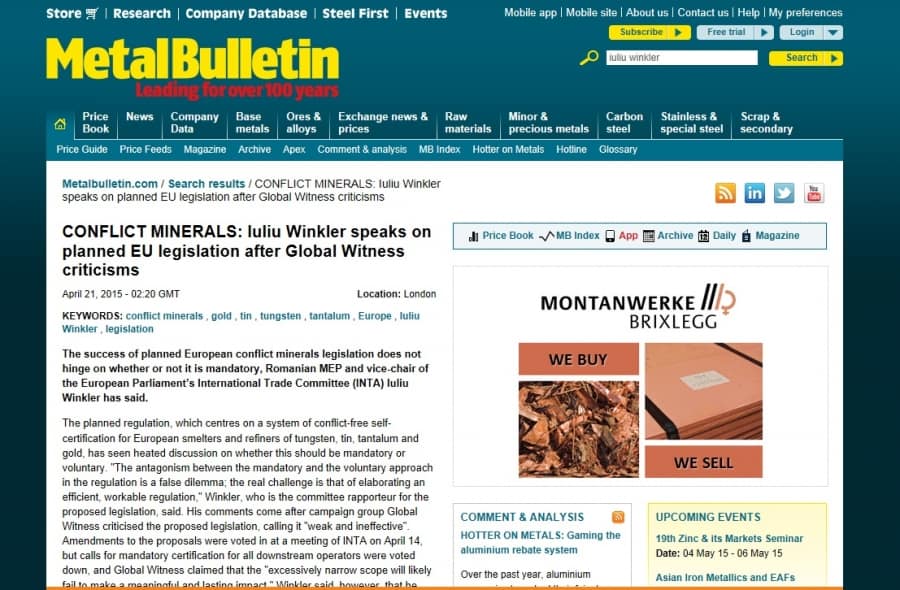The success of planned European conflict minerals legislation does not hinge on whether or not it is mandatory, Romanian MEP and vice-chair of the European Parliament’s International Trade Committee (INTA) Iuliu Winkler has said.
The planned regulation, which centres on a system of conflict-free self-certification for European smelters and refiners of tungsten, tin, tantalum and gold, has seen heated discussion on whether this should be mandatory or voluntary.
“The antagonism between the mandatory and the voluntary approach in the regulation is a false dilemma; the real challenge is that of elaborating an efficient, workable regulation,” Winkler, who is the committee rapporteur for the proposed legislation, said.
His comments come after campaign group Global Witness criticised the proposed legislation, calling it “weak and ineffective”.
Amendments to the proposals were voted in at a meeting of INTA on April 14, but calls for mandatory certification for all downstream operators were voted down, and Global Witness claimed that the “excessively narrow scope will likely fail to make a meaningful and lasting impact.”
Winkler said, however, that he believes compromises reached during the vote by the European People’s Party (EPP), the European Conservatives and Reformists (ECR) and the Alliance of Liberals and Democrats (ALDE) Groups “fulfil the core objective of the EU approach, which is breaking the link between conflict financing and minerals extraction”.
“Putting an end to profits from the trade of minerals being used to fund armed conflicts while promoting responsible sourcing from conflict-affected areas is the aim of the European Parliament’s report on an EU system for supply chain due diligence self-certification,” Winkler said.
He stressed that he believes the compromises reached following the vote at the INTA meeting “will help both the local communities of the conflict areas and the European stakeholders”.
“It is a very important consensus that we have reached between the EPP, ECR and ALDE Groups […] in order to adopt an efficient and workable regulation capable of focusing on two priorities: empowering local communities in conflict-affected areas, and increasing responsible behaviour of all stakeholders involved in trade,” he said.
He added that there is a “common effort towards transparency, and control” of the use of so-called 3TG minerals from conflict areas.
If and when the legislation is passed, all EU smelters and refiners of 3TG minerals will be obligated to take part in the due diligence self-certification scheme, Winkler said.
“In order to achieve the effects that the European Parliament is pushing for, the trade regulation has to fulfil several conditions,” he added.
This includes taking into account existing industry-led self-certification schemes and initiatives by providing recognition for established, OECD-based schemes.
The planned legislation must also “respect the principles of prudent and proportionate legislating in order to avoid the unilateral imposition of obligations on EU companies”.
There must be “consistent uptake and a steady march of the minerals market on the path of responsible conflict-free certification, especially acknowledging the large number of SMEs involved”.
There must also be a “strong and clear” review clause in the legislation, providing the possibility to evaluate the effects of the regulation on the ground in conflict-affected regions, as well as uptake by EU companies.
“The review shall provide the opportunity to accommodate evolutions in the OECD due diligence framework regarding additional minerals beyond the 3TG,” Winkler said.
For now, however, the legislation does not cover material other than tin, tungsten, tantalum and gold, as a proposal to broaden the scope in this respect was also voted down.
The legislation must also avoid “disengagement from conflict areas”, as well as the so-called “de facto embargo” on all African material, witnessed in the wake of the imposition of section 1502 of Dodd-Frank act.
It must protect against “any surge in smuggling and illegal trade with a negative price effect by providing a functional and workable implementing framework”, Winkler said.
The integrated EU approach is based on three pillars, he added:
* Setting up a supply chain due diligence self-certification scheme for responsible EU importers of 3TG, “proportionate and harmonised with EU raw material policies”, able to break the link between mineral extraction, related trade and funding conflict, while “preserving legitimate and responsible economic activity in conflict areas”;
* Measures to support EU companies in their uptake of the self-certification system, with a “special focus” on European small and medium-sized enterprises;
* Accompanying measures to be brought in through “political, diplomatic and development cooperation on the ground in conflict-affected and high-risk areas”, aimed at supporting “capacity building, better governance and educating all the stakeholders involved”.
Claire Hack








